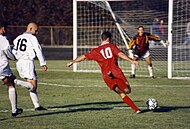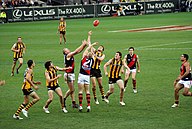Boolu-afesegba
Bọ́ọ̀lù-àfẹsègbá jẹ́ ọ̀kan lára àwọn eré-ìdárayá tó ní ṣe pèlú fífi ẹsẹ̀ gbá bọ́ọ̀lù. Eré-ìdáraya h yìí pẹ̀ka sóríṣiríṣi ọ̀nà, ara rẹ̀ la ti rí association football, gridiron football tàbí American football tàbí Canadian football, Australian rules football, rugby union pẹ̀lú rugby league àti Gaelic football.[1] Oríṣi ẹ̀ka bọ́ọ̀lù-àfẹsẹ̀gbá wọ̀nyí ní nǹkan tó pa wọ́n pọ̀, tí a mọ̀ sí kóòdù bọ́ọ̀lù-àfẹsẹ̀gbá[2]
 An attacking player (No. 10) attempts to kick the ball past the goalkeeper and between the goalposts to score a goal | |
| Highest governing body | FIFA |
|---|---|
| Nickname(s) | Football, soccer, futbol, footy/footie, "the beautiful game" |
| First played | Mid-19th century England |
| Characteristics | |
| Contact | Yes |
| Team members | 11 per side |
| Mixed gender | Yes, separate competitions |
| Categorization | Team sport, ball sport |
| Equipment | Football |
| Venue | Football pitch |
| Olympic | 1900 |
Oríṣiríṣi ìtọ́kasí ló wà fún bọ́ọ̀lù ìbílẹ̀ tí wọ́n ń gbá káàkiri àgbááyé.[3][4][5] Ó sì ní òfin tó de wọ̀n, àwọn òfin yìí ti wà láti sẹ́ńtúrì kọkàndínlógún.[6][7] Ìtànkálẹ̀ British Empire mú kí àwọn òfin yìí tàn káàkiri eré náà.[8] [9]
Ní ọdún 1888, wọ́n ṣe ìdásílẹ̀ The Football League ní England, èyí sì jẹ́ ẹgbẹ́ bọ́ọ̀lù-àfẹsẹ̀gbá alámọ̀dájú àkọ́kọ́. Ní sẹ́ńtúrì ogún, ọ̀pọ̀lọpọ̀ bọ́ọ̀lù àfẹsẹ̀gbá lọ́ríṣiríṣi wá di ìlú-mọ̀ọ̀nká, tí wọ́n sì ń gbá káàkiri orílẹ̀-èdè ní àgbááyé.[10]
Àwọn ìtọ́kasí
àtúnṣe- ↑ Reilly, Thomas; Gilbourne, D. (2003). "Science and football: a review of applied research in the football code". Journal of Sports Sciences 21 (9): 693–705. doi:10.1080/0264041031000102105. PMID 14579867.
- ↑ "In a globalised world, the football World Cup is a force for good". The Conversation. 10 July 2014. Archived from the original on 8 August 2014. Retrieved 11 July 2014. Unknown parameter
|url-status=ignored (help) - ↑ "History of Football – Britain, the home of Football". FIFA. Archived from the original on 22 September 2013. Retrieved 15 June 2018. Unknown parameter
|url-status=ignored (help) - ↑ Post Publishing PCL.. "Bangkok Post article". Bangkok Post. http://www.bangkokpost.com/print/413747/.
- ↑ "History of Football – The Origins". FIFA. Archived from the original on 24 April 2013. Retrieved 29 April 2013. Unknown parameter
|url-status=ignored (help) - ↑ "History of Rugby in Australia". Rugby Football History. Archived from the original on 23 December 2011. Retrieved 11 January 2012. Unknown parameter
|url-status=ignored (help) - ↑ Bailey, Steven (1995). "Living Sports History: Football at Winchester, Eton and Harrow". The Sports Historian 15 (1): 34–53. doi:10.1080/17460269508551675.
- ↑ Perkin, Harold (1989). "Teaching the nations how to play: sport and society in the British empire and commonwealth". The International Journal of the History of Sport 6 (2): 145–155. doi:10.1080/09523368908713685.
- ↑ Reilly, Thomas; Doran, D. (2001). "Science and Gaelic football: A review". Journal of Sports Sciences 19 (3): 181–193. doi:10.1080/026404101750095330. PMID 11256823.
- ↑ Bale, J. (2002). Sports Geography. Taylor & Francis. p. 43. ISBN 978-0-419-25230-6. https://books.google.com/books?id=hc9f-aKPPxAC.





